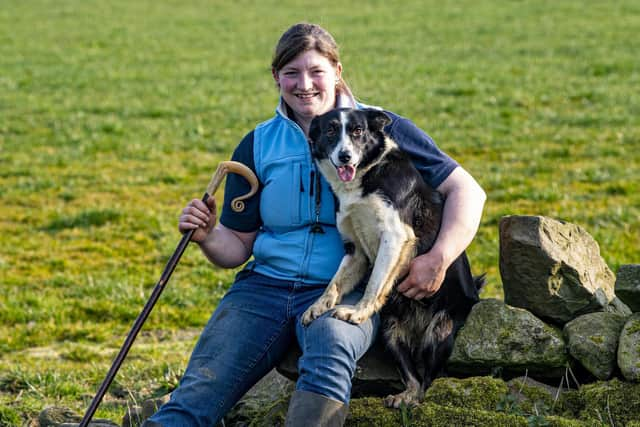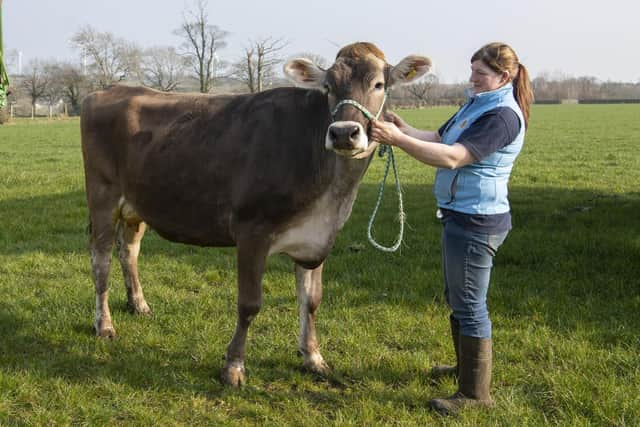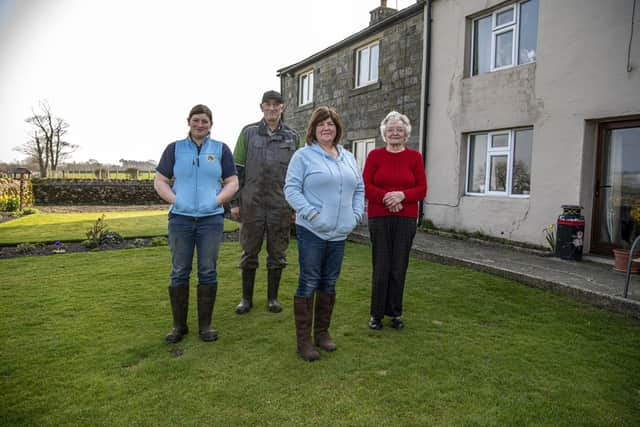Farm of the Week: Young woman with Yorkshire's only pedigree Brown Swiss herd
Emily Bradley farms with her father Stephen at Inglehurst Farm near Felliscliffe where their herd of 120 dairy cows is made up of Holstein and Brown Swiss breeds.
Stephen said he’s still ‘the boss’ but gives his daughter free rein to take the herd forward.
Advertisement
Hide AdAdvertisement
Hide Ad“We discuss everything and then Emily does what she wants more or less. Emily will go through a semen catalogue and the next thing I know there’s a bill coming for something expensive. She is working hard with increasing the quality of our cows and handles all of the AI work on the herd.


“We went more towards Holsteins than Friesians when I left school in the late 70s. I saw the Brown Swiss breed at the Dairy Event in Stoneleigh about 30 years ago. I thought they looked well and so we looked into starting with them.”
The Brown Swiss has earned a formidable reputation as a strongly built, good-looking cow that has greater insect resistance due to its darker pigmentation including around its eyes. Stephen said it also offers a flatter lactation curve.
“Its first lactation won’t be as good as a Holstein but after that she will perform better for each subsequent lactation. You don’t serve them as soon either. We serve ours at two and a half years.”


Advertisement
Hide AdAdvertisement
Hide AdEmily said she is euphoric at the moment, having recently received notification of full pedigree status being conferred on her herd.
“I’ve been working towards full pedigree for years. I do a bit of showing of them, at Nidderdale Show, and you’re allowed to do it despite them not being full pedigree because there is a system in place called grading up, but I’ve finally received confirmation that we have at last achieved 100 per cent pedigree this year.
“We are now officially the only pedigree registered Brown Swiss herd in Yorkshire. It’s quite an honour. I’d love for there to be a Brown Swiss section in the dairy cattle at the Great Yorkshire Show.”
Emily said she uses sexed semen on around 30 of the dairy herd every year. “Dad never wanted me faffing with bulls, so when I left school at 16 I went on an AI course and I’ve AI’d the herd ever since. For the first couple of years we only used conventional semen, as sexed semen started getting better I started using it regularly. I now have all my best cows and maiden heifers on it, with the others going to conventional. We try for 25 replacements every year.”


Advertisement
Hide AdAdvertisement
Hide AdStephen said their herd average reflects their dairying philosophy.
“Our average yield across the whole herd of both Holsteins and Brown Swiss is somewhere between 7,000-8,000 litres per lactation. We do have some that give 10,000-11,000 but we don’t push for it. I’d rather have a reasonable yield and a decent lifespan for a cow.
“We have a lot of older cows, our oldest is 13. The Brown Swiss cows will normally last a couple of years more than the Holstein.”
Brown Swiss cows have a reputation for being good grazers but Stephen said the farm’s location and their silage policy means they usually get to graze a little later than some herds.
Advertisement
Hide AdAdvertisement
Hide Ad“It all really depends on the weather and what silage we have left. Where we are is a wet farm and so, if we have plenty of silage still available we tend to feed it right up to our first cut, which is usually the end of May. The cows then go out.
“Our land varies too. We farm 280 acres overall but only 62 acres here in one parcel and various bits all over the place including 100 acres at Knaresborough, which is our furthest point away.”
Stephen said the herd’s milk goes to Payne’s Dairies, but that the current worldwide hike in the milk price is welcome, although it doesn’t mean they are any better off.
“Everything else has gone up too. Fuel, feed, fertiliser, so it still needs to be a lot higher to cover our rise in input costs.”
Advertisement
Hide AdAdvertisement
Hide AdEmily said the Bradleys’ beef enterprise has developed recently.
“We use Aberdeen Angus semen on the rest of the herd that is not sexed semen for the dairy cow replacements because of easy calving and we get a decent calf.
“We’ve just taken on the land at Knaresborough and we are now keeping 50 Angus cattle to go as stores at about a year old.”
While Emily currently runs a small sheep flock of 20 Mule and Texel-cross ewes the plan is to get to a flock of around 60 with finished lambs going to Wharfedale.
Advertisement
Hide AdAdvertisement
Hide AdThe Bradleys' other main enterprise is agricultural contracting and Stephen said they have a niche market with their forage wagons that cut and collect grass for silage.
“We used to have self-propelled foragers but they tied up too much money. Going into forage wagons is the best move we’ve ever made. We now have three wagons and cover about 3,000 acres.”
Stephen’s mum Rhoda said she came to Inglehurst with her husband Eric, Stephen’s father, in 1959 when the farm ran to 24 acres and they milked just a dozen cows, and that she continues to do her bit today.
“The milk stand where we used to take the milk churns is still at the top of our lane by the roadside - and I still get on the tractor to row up.”
Advertisement
Hide AdAdvertisement
Hide AdMichelle, Stephen’s wife, said that she married Stephen after having met him when she had come from Harrogate to see a friend at the neighbouring farm.
“I was mucking out a barn next door when Stephen turned up in his tractor and the rest is history. We have two sons as well as Emily and we are now grandparents.”
Stephen said Emily started young on the dairy herd. “Emily was milking cows by the time she was 10 years old, and she knew every cow’s name, their eartag and freezebrand numbers.”
Emily said she never wanted anything but to work with cows. “I have always been around livestock. I enjoy shooting, I’m a member of Farnley Estate YFC, but I really love my Brown Swiss cows.
